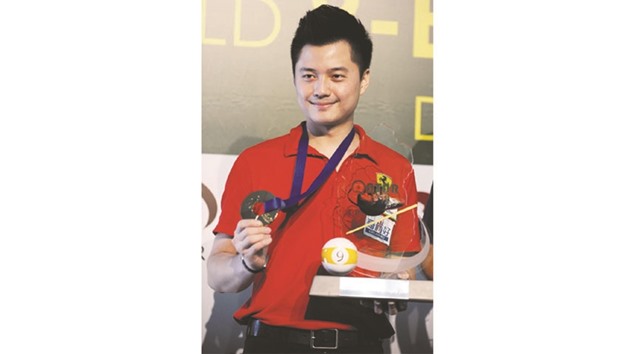Ko Pin Yi makes a return to Qatar after a dramatic 2015, which saw him win world titles in 9-ball and 10-ball, for the 25th edition of the WPA World 9-ball Championship, which kicks off at the Al Arabi Sports Club today.
Last year, the Taiwanese player cemented his status as pool’s true hardcore man, defeating America’s Shane Van Boening in the final, 13-11.
Since 1991, when Earl Strickland won his second straight world titles, the question about who will do so next has always remained. The 26-year-old will be subject to similar scrutiny when 128 players from 40 countries will clash to see who will be crowned the king of 9-ball pool.
This will be the seventh straight year that the Gulf country, through the Qatar Billiards and Snooker Federation (QBSF), has backed pool’s biggest and most important event.
In 24 previous editions, dating back to 1990, the World 9-ball Championship has always provided the kind of nerve rattling drama that has captured the imagination of fans from around the globe. It’s that kind of pressure cooker atmosphere that has always weeded out the pretenders, and produced a veritable pantheon of pool greats.
A look down the list of past World 9-ball champions reads exactly like a who’s who of the sport. Multiple winners include the legendary Earl Strickland (1990, ’91, ’02), Johnny Archer (’92, ’97), Taiwan’s Fong Pang Chao (’93, 2000) and Thorsten Hohmann (2003, ’13).
Germany’s Ralf Souquet (’96) and Oliver Ortmann (’95), Finland’s Mika Immonen (’01), the Netherlands Niels Feijen (’14), the Philippines Alex Pagulayan (’04), Ronnie Alcano (’06), and Francisco Bustamante (’10) all cemented their status as giants of the game by winning the World 9-ball Championship.
The World 9-ball Championship is the event where Japan has often displayed it’s incredible pool talent with winners Takeshi Okumura (1994), Kunihiko Takahashi(1998) and Yukio Akagariyama(2011.)
And then there are the incredible victories that have been etched into the minds of pool fans for all time; the Philippines Efren Reyes winning in 1999 and setting off a pool revolution in his home country; Taiwan’s Wu Chia Ching, only 16 years old, finding the courage to take 5 straight racks to win a seemingly impossible title in 2005); England’s Daryl Peach somehow fending off an entire country in 2007, capturing glory in the Philippines against Filipino Roberto Gomez; England’s Darren Appleton blowing a seemingly insurmountable lead to China’s Li Heiwen, only to find the will to win a pressure packed one rack decider to win his first World 9-ball crown (2012.)
As usual the tournament will be run in two brutally difficult parts. The Group stages will run from July 30 through August 1. The players will be broken up into 16 groups of 8 playing a race-to-9, alternate break, double elimination format. Four players from each group will make up the final 64, which marks the start of the always tense and dramatic single elimination phase of the tournament. Matches will then become race to 11, alternate break. The final, which takes place on August 4, will be a race to 13. The winner of the 2016 edition will receive $40,000, while the runner up $20,000. The total prize fund is $200,000.
One new twist this year that will surely have an impact on the outcome of the tournament is a new rule instituted by the WPA that will see the 9-ball placed on the spot rather than the traditional 1-ball.
For years, players have often complained that with the 1-ball on the spot, the game was becoming too easy. Players the world over had figured out how to pocket at least one wing ball on the break, thus ensuring easier run-outs for even the less talented players. But with the 9-ball on the spot, the game becomes more difficult as the physics of the rack make it harder to make a ball on the opening break shot.
This new rule, which is being provisionally tried out by the WPA for 12 months, is expected to favour the better players, and those who can grind out long, tiring matches. (WPA)

Ko Pin Yi
